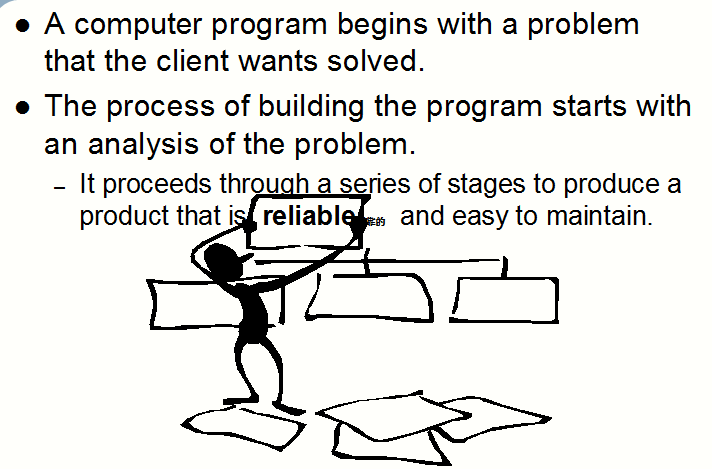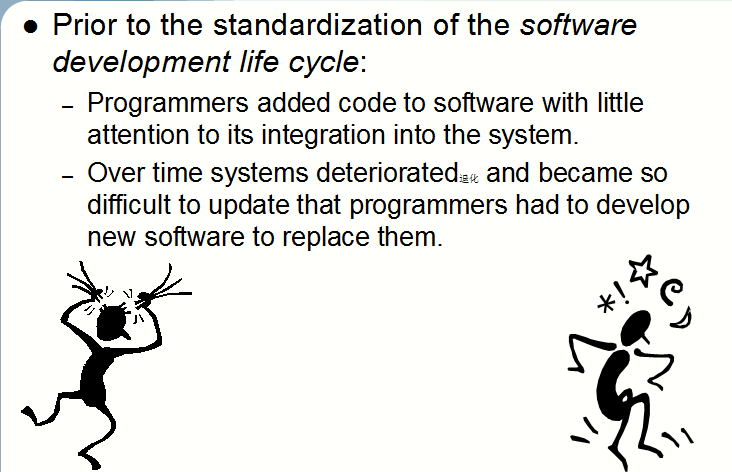一.开场白
第二次《DATA STRUCTURES AND PROBLEM SOVLING WITH C++》英文授课,让我产生英文写文章的念头。但是,慢慢开始参合英文吧。一下子写的话,怕写出来博客园首页都不敢收录了。^_^!今天,从课堂和自己下午看总结下,关于Object Design Techniques的3点:
①Program Design
②Handling RunTime Errors
③Operator Overloading[操作符重载]
二.程序设计-Program Design
#关于程序设计,程序或大或小,出现必然有它的原因。
1)这就是计算机程序出现于一个客户想要解决的问题。
2)计算机程序开始于对问题的分析,然后产生的程序是可靠的,容易维护的。
这点很难,可靠不是绝对的,相对可靠慢慢接近。而容易维护,则建立在demo功底上,慢慢重构自己的demo才能有所为,达到容易维护。
如图:
#软件生命周期 the software development life cycle
1)工程师添加该软件demo然不考虑对系统的集成。
2)系统的退化导致系统难更新,工程师需要创造新的软件代替。
第一点我没体会出来。先记下了。
如图:
#Requst → Analysis → Design → Implementation → Testing → Maintenance
这点我就不细说了,一个开放的流程。我也体会着。
三.Handling RunTime Errors
书上分三种,主要的是 Terminate Program , Set a Flag ,C++ Exceptions。我觉得不止,待会查查跟新上去。
1)终止程序 Terminate Program
在c++标准库(d_time24.h)中的实现(这是老版本中):
exit(1); //终止程序
time24 time24::duration(const time24& t)
{
// convert current time and time t to minutes
int currTime = hour * 60 + minute;
int tTime = t.hour * 60 + t.minute;
// if t is earlier than the current time, throw an exception
if (tTime < currTime)
{
cerr << "time24 duration(): argument is an earlier time";
exit(1);
}
else
// create an anonymous object as the return value
return time24(0, tTime-currTime);
}
2)C++ Exceptions 抛异常
在c++标准库(d_time24.h)中的实现(这是新版本中):
throw rangeError("time24 duration(): argument is an earlier time");//抛出异常
time24 time24::duration(const time24& t)
{
// convert current time and time t to minutes
int currTime = hour * 60 + minute;
int tTime = t.hour * 60 + t.minute;
// if t is earlier than the current time, throw an exception
if (tTime < currTime)
throw rangeError(
"time24 duration(): argument is an earlier time");
else
// create an anonymous object as the return value
return time24(0, tTime-currTime);
}
3)Set a Flag
最常用的然后是 Bool,然后结合判断语句来进行。
四.运算符重载 Operator Overloading
课文中学的不是很清楚,看清楚了我会更新上去。找了下人家的文章,http://www.cnblogs.com/jiaohuang/archive/2011/03/26/2079111.html
1)在类中重载+=操作符
赋值操作符必须定义为成员函数,无论形参为何种类型。赋值必须返回*this 的引用
2)在类外面的重载+
3)在类外面的输入输出操作符
自己更新内容:
1)定义:
String 里面 有个 equals()方法 和 == 相似。所以这些函数的操作和数字的算术运算相似,定义为重载运算符。
2)例子:
Stream I/O Operators
(Output) <<: friend ostream& operator<<(ostream& ostr, const className& obj); (Input) >>: istream& operator>>(istream& istr, className& obj);
3)重载运算符两种方法:
#实现使用运算符函数的自由函数
运算符可以重载为自由函数或类成员函数。使用运算符函数形式可以讲运算符重载为自由函数。在c++标准库(d_time24.h)中,用于比较time24两个对象,
==的形式为:
bool operator== (const time24& lhs, const time24& rhs);
它的实现必须是公有成员函数访问数据:运算符 == (自由格式函数)
// compare hours and minutes bool operator== (const time24& lhs, const time24& rhs) { return lhs.hour == rhs.hour && lhs.minute == rhs.minute; }
#将运算符函数申明为类的友元
这个函数不是类成员,可以访问类private部分,这种技术避免调用类成员。友元函数(友元)可以使用类中的私有成员函数的自由函数,是直接在函数原型前加上关键字 firend 。友元不是类的成员函数。在c++标准库(d_time24.h)中,+运算符:
friend time24 operator+ (const time24& lhs, const time24& rhs); // form and return lhs + rhs friend time24 operator+ (const time24& lhs, int min); // form and return lhs + min // Precondition: min must be >= 0 friend time24 operator+ (int min, const time24& rhs); // form and return min + rhs // Precondition: min must be >= 0
可以从实现中看出,用多种运算符对增加对象的时间增加了灵活性。
// create an anonymous object with hour = lhs.hour + rhs.hour // and minute = lhs.minute+rhs.minute. time24 operator+ (const time24& lhs, const time24& rhs) { return time24(lhs.hour+rhs.hour, lhs.minute+rhs.minute); } // create an anonymous object with hour = lhs.hour and // minute = lhs.minute + min. time24 operator+ (const time24& lhs, int min){ return time24(lhs.hour, lhs.minute + min); } // return the value rhs + min that is computed by // time24 operator+ (const time24& lhs, int min) time24 operator+ (int min, const time24& rhs) { return rhs + min; }
五.总结
数据结构果然是必修课,喜欢。下了严蔚敏的数据结构视频,在学下。给个分享吧,http://pan.baidu.com/s/1pJ8V9er

